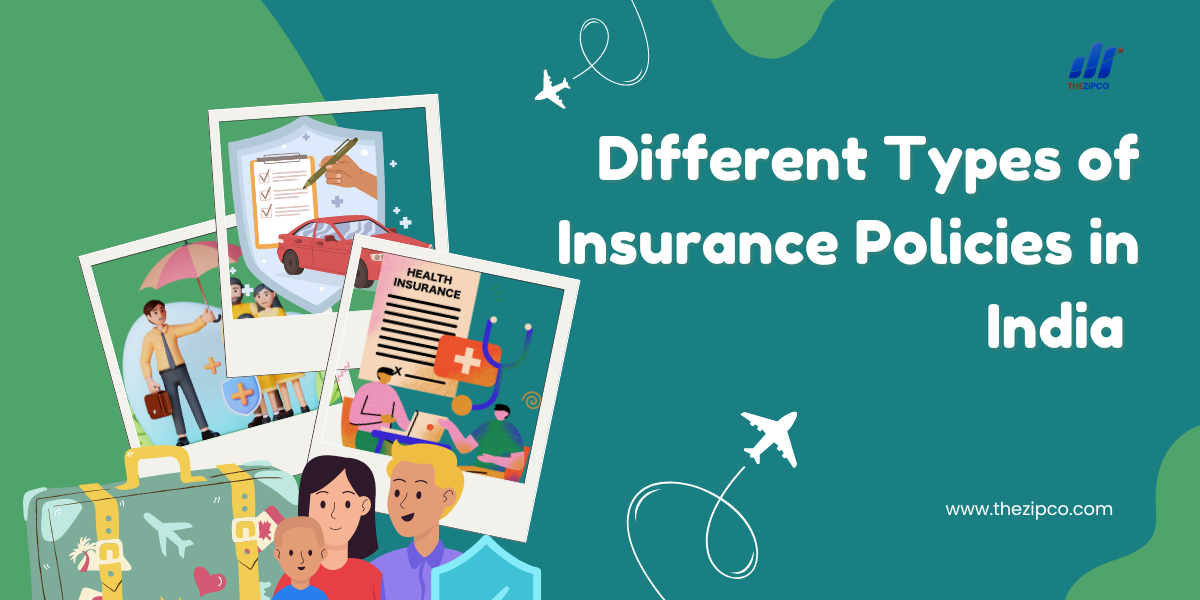Accidents and losses, including death, are sudden and life-altering events that arrive without warning. While we can’t prevent these unpredictable occurrences, we can protect ourselves from their impact. Insurance serves as a crucial safeguard against such uncertainties. Choosing the right types of insurance with adequate coverage is a wise decision to protect our assets and financial well-being.

What are the Different Types of Insurance Available?
Insurance comes in many forms, but it can generally be divided into two main categories:
- Life Insurance
- General Insurance
Life Insurance offers financial protection related to your life, while General Insurance covers losses related to non-life assets.
Here’s a breakdown of these two types of insurance:
- General Insurance
In India, the main types of General Insurance policies include:
- Health Insurance
- Motor Insurance
- Travel Insurance
- Property Insurance
- Commercial Insurance
- Asset Insurance
- Pet Insurance
- Bite-Sized Insurance
- Life Insurance
The primary types of Life Insurance policies in India are:
- Term Insurance
- Whole Life Insurance
- Endowment Policy
- Money Back Policy
- Pension Plan
- Unit Linked Insurance Plans
- Child Plans
Let’s explore these insurance types in detail:
What are the Different Types of General Insurance?
Essentially, any insurance that isn’t classified as Life Insurance falls under General Insurance.
General Insurance protects against financial losses resulting from the damage or loss of insured assets. It covers your assets, such as your bike, car, home, travel, health, or even your valuable electronic gadgets, against potential losses.
1. Health Insurance
Health Insurance protects you from the financial burden of medical emergencies and illnesses.
Different types of health insurance include:
- Individual Health Insurance: Covers a single policyholder.
- Family Floater Health Insurance: Covers the entire family under one policy.
- Group Health Insurance: Covers employees within an organization.
Key health insurance products available in India are:
- Senior Citizen Health Insurance
- Maternity Health Insurance
- Aarogya Sanjeevani
- Super Top-Up Insurance
- OPD Insurance
- Personal Accident Cover
2. Motor Insurance
Motor Insurance is essential not only because it’s mandatory in India, but also because it provides comprehensive protection for your vehicle against damages from natural or man-made disasters, as well as third-party liabilities.
Motor Insurance is categorized based on the type of vehicle:
- Car Insurance
- Two-Wheeler Insurance
- Commercial Vehicle Insurance
Types of Motor Insurance policies:
- Third-Party Insurance Policy: Covers the financial liability to third parties in an accident, protecting you from legal issues.
- Comprehensive Insurance Policy: Covers third-party liabilities and also repairs to the policyholder’s vehicle due to accidents, fire, natural or artificial calamities, and more.
- Own Damage Policy: Offers the same coverage as a comprehensive policy, excluding third-party liability.
Additional add-ons include: Zero depreciation cover, Loss of personal belongings cover, Pay-as-you-drive cover, and Daily conveyance cover.
3. Travel Insurance
Travel Insurance provides financial protection during your travels, covering incidents like loss of baggage, passport, hijacking, medical emergencies, flight delays, accidental death, and adventure sports.
Types of Travel Insurance:
- Domestic Travel Insurance: For travel within India.
- International Travel Insurance: For travel outside India.
- Student Travel Insurance: For students pursuing education abroad.
Variants include: Individual Travel Insurance, Family Travel Insurance, Senior Citizen Travel Insurance, Corporate Travel Insurance, Multi-Trip Travel Insurance, Single-Trip Travel Insurance, and Schengen Travel Insurance.
4. Property Insurance
Property Insurance offers financial reimbursement for the owner or renter of a building and its contents.
Common Property Insurance products include:
- Home Insurance
- Shop Insurance
- Burglary Insurance
- Office Insurance
- Fire Insurance
5. Commercial Insurance
Commercial Insurance protects businesses from financial risks, offering coverage for the business itself, its employees, and ownership.
Types of Commercial Insurance:
- Liability Insurance: Protects against third-party damages, including:
- Directors and Officers Liability Insurance
- General Liability Insurance
- Public Liability Insurance
- Cyber Insurance
- Marine Cargo Insurance: Covers goods transported via inland transit.
- Engineering Insurance: Protects against risks associated with engineering and machinery, including:
- Contractor’s All-Risk Insurance
- Erection All Risk Insurance
- Plant and Machinery Insurance
- Workmen Compensation Insurance: Provides financial coverage for employees injured or killed at work.
- Crop Insurance: Covers financial losses from poor crop seasons, crop failure, or related issues.
6. Asset Insurance
Asset Insurance protects valuable assets like mobile phones, TVs, and other electronics, covering the cost of repairs and replacements.
7. Pet Insurance
Pet Insurance covers the health and well-being of pets, including medical conditions, pregnancy complications, dental treatments, insect-borne diseases, and more. It also offers coverage for pet theft, third-party damages, accidents, and overseas incidents, depending on the policy.
8. Bite-Sized Insurance
Bite-Sized Insurance, also known as small-ticket or sachet insurance, provides low-premium coverage for specific needs. This category spans across various insurance types like health, travel, and property.
Common Bite-Sized Insurance products include:
- Online Fraud Protection
- Cab Ride Insurance
- Backpack Insurance
- Marathon Insurance, and more.
Life Insurance
Life Insurance provides financial protection for the most uncertain aspect of life itself. It ensures that the policyholder’s family is financially secure in the event of death or disability. Some life insurance policies also include a savings component, making them a valuable investment option.
Here are the major types of Life Insurance policies available in India:
1. Term Insurance
Term Insurance offers life coverage for a specified period, known as the “term” of the policy. These policies generally have lower premiums since they don’t accumulate cash value. If the policyholder dies during the term, the nominee receives the Sum Assured. Some Term Plans offer a Return of Premium option, where the policyholder receives the premiums back if they survive the term.
2. Whole Life Insurance
Also called Traditional Life Insurance, Whole Life Insurance provides lifelong coverage. It includes a savings component and accrues periodic bonuses. These plans usually mature at 100 years, and if the policyholder reaches this age, they receive a maturity benefit.
3. Endowment Policy
Endowment Policies combine insurance with investment. A portion of the premium goes towards life coverage, while the rest is invested in low-risk options. If the policyholder passes away during the term, the Sum Assured is paid to the nominee. If they survive, they receive the maturity amount along with any bonuses.
4. Money Back Policy
Money Back Policies are similar to Endowment Plans but with the added feature of periodic payouts during the policy term. Upon maturity, the remaining benefits are paid along with bonuses. If the policyholder dies during the term, the full Sum Assured is paid to the nominee, regardless of previous payouts.
5. Unit Linked Insurance Plans (ULIPs)
ULIPs offer both life coverage and investment opportunities by allocating premiums to various market-linked funds, such as Equity, Hybrid, and Debt funds. ULIPs allow for partial withdrawals after a five-year lock-in period and offer the flexibility to switch between funds to align with financial goals.
6. Pension Plan
Pension Plans, also known as Retirement Plans, help accumulate funds for post-retirement life. You contribute a portion of your income as premiums during your working years, and in retirement, these funds are paid back as a regular annuity or pension, providing financial security in your later years.
7. Child Plans
Child Plans are designed to secure a child’s future in case of the policyholder’s death. If the policyholder passes away, the child receives a Sum Assured, and future premiums are waived off or paid by the insurer. The child continues to receive periodic payouts, ensuring their education and future are not compromised.
What Are the Benefits of Insurance?
Benefits of General Insurance
Every individual should have a general insurance policy due to the risks posed by accidents, medical emergencies, natural disasters, and other unforeseen events. Such a policy offers financial protection when these situations occur. While we can’t predict accidents or calamities, we can be better prepared to manage their impact.
Here are some key benefits of General Insurance:
- Legal Requirement: For many categories, insurance coverage is legally mandatory. For instance, the Motor Vehicles Act 1988 requires motor insurance, ensuring that your vehicle is financially protected while complying with the law.
- Financial Protection: General Insurance plans provide compensation for losses, serving the primary purpose of protecting your finances and savings in the event of unfortunate circumstances.
- Tax Benefits: Many General Insurance plans offer tax advantages. For example, premiums paid towards medical insurance qualify for tax deductions under Section 80D of the Income Tax Act.
Benefits of Life Insurance
Life Insurance acts as a shield that safeguards your dependent family in case something happens to you. Here are the key benefits of Life Insurance:
- Financial Security: The primary benefit of Life Insurance is financial protection for your family. It ensures that your family’s financial stability remains intact even if the primary earner passes away.
- Tax Benefits: Life Insurance policies offer tax benefits. Premiums paid are tax-deductible under Section 80C of the Income Tax Act. Additionally, the payouts, including the sum assured, maturity benefits, and bonuses, are tax-free under Section 10(10)D of the IT Act.
- Loan Repayment Security: With Life Insurance, you don’t have to worry about loan repayments in the event of your death. The policy can cover outstanding loans, relieving your family from financial burdens.
- Child’s Future Security: Life Insurance, particularly Child Education Plans, helps build a corpus for your child’s education. These plans ensure that your child’s educational goals are met, even in the unfortunate event of a parent’s death.
- Retirement Income: Retirement Plans, which are annuity-based, provide periodic payments after retirement while also offering life cover to secure your dependents financially.
Keep reading and supporting thezipco!
Disclaimer: This information is added only for informative purposes and collected from different sources across the Internet. Thezipco is not promoting or recommending anything here. Please verify the information before making any decisions.

